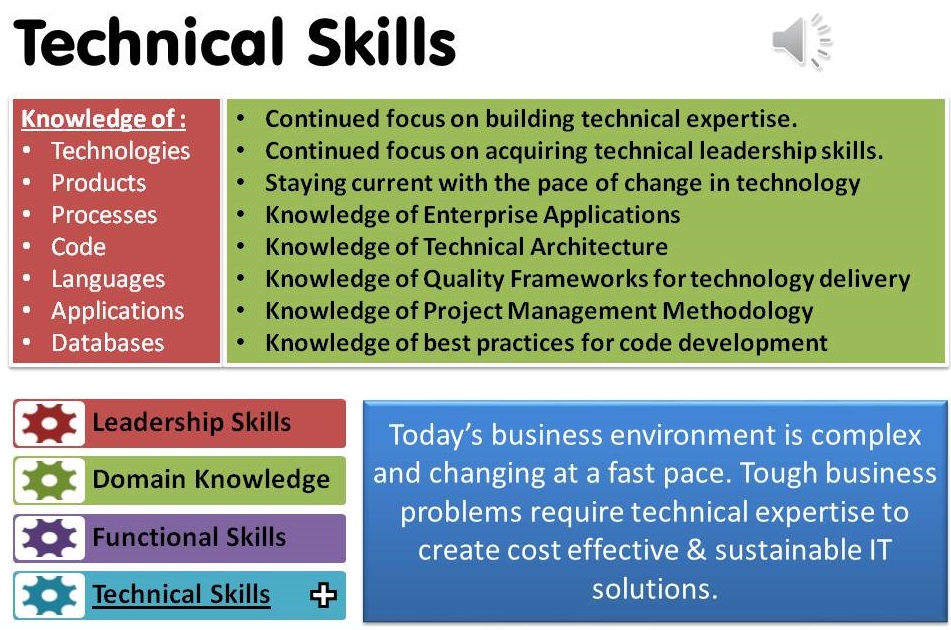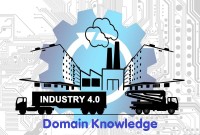- Home
- Business Processes
- Industry Knowledge
- Aerospace Industry
- Automotive Industry
- Banking Domain
- BFSI Industry
- Consumer/ FMCG Industry
- Chemicals Industry
- Engineering & Construction
- Energy Industry
- Education Domain
- Finance Domain
- Hospitality Domain
- Healthcare Industry
- Insurance Domain
- Retail Industry
- Travel and Tourism Domain
- Telecom Industry
- Leadership Skills
- eLearning
- Home
- Leadership
- Career Management
- Importance of Technical Skills
Importance of Technical Skills
Today’s business environment is complex and changing at a fast pace. Tough business problems require technical expertise to create cost-effective & sustainable solutions. All industries need some kind of technical skills to accomplish complex actions, tasks, and processes relating to computational and physical technology as well as a diverse group of other enterprises. The acquisition of advanced technical skills requires specific education certification or training, often with practical hands-on learning.
Your employee should have superior technical skills than you. If he doesn't, it means you have hired the wrong person.
- Jack Ma
What do we mean by Technical Skills?
Technical skills are the abilities and knowledge needed to perform specific tasks. Technical skills also refer to the expertise of a certain type of market participant who uses technical analysis signals to buy and sell stocks, bonds, futures, and other financial instruments. They are practical and often relate to mechanical, information technology, mathematical, or scientific tasks. Typical technical skills are programming, the analysis of complex figures, or the use of specific tools.
Technofunc defines technical skills as gaining knowledge of:
- Technologies: More you understand the latest technologies the more competitive you are.
- Products: Latest technical products and the solutions they offer for business problems.
- Processes: technical Processes and how they integrate with business processes;
- Code: Knowledge of underlying code for your chosen technical area.
- Languages: Different software languages to write build the code.
- Applications: Enterprise-wide applications that provide a solution to current technological issues.
- Databases: Knowledge of databases and database management.
Today’s business environment is complex and changing at a fast pace. Tough business problems require technical expertise to create cost-effective & sustainable IT solutions.
Examples of Technical Skills
With the unprecedented growth in the IT and Software Industry, many folks associate and believe that technical skills are coding skills and required only for jobs related to information technology (IT) and other fields in the sciences. However, all industries need some kind of technical skills to accomplish complex actions, tasks, and processes relating to computational and physical technology as well as a diverse group of other enterprises. Technical skills are practical ones, typically related to the fields of mechanics, information technology, mathematics, and science.
Technical skills vary widely between industry and job type. For computer programmers, knowledge of various coding languages is considered a technical skill. Some examples include knowledge of programming languages, design programs, mechanical equipment, or tools. In finance, technical skills include an array of knowledge topics that include computing abilities, quantitative analysis, and various financial market forecasting techniques.
Given below are some examples of technical skills:
- Business intelligence/analytics
- Project management skills
- Big data and computing
- Developers and programmers including IT Coding and IT security
- Database management
- Cloud and SaaS
- Technical writing
- Operating Systems
- Stock Analysis
- Data Analysis
- Web development
- Android and iOS and Mobile apps and digital management
- Help desk/Technical support
Who are Technical Experts?
Those who possess technical skills are often referred to as "technicians", like electronics experts, computer experts, software developers, programmers, and a variety of other designations. Technical skills are a specialized set of knowledge required to perform practical tasks in the areas of mechanics, science, and mathematics, and information technology. In finance, technical skills may refer to technical analysts who do an analysis of stocks and share prices and provide advice to investors. In most cases, the acquisition of advanced technical skills requires specialized training or education. The acquisition of advanced technical skills requires specific education certification or training, often with practical hands-on learning.

Importance of Technical Skills
Every job requires a different skillset and that’s why the technical skills are most demanded and very important for every career for a number of reasons. They give you the fundamental expertise and can help you work more efficiently, boost your confidence, and make you a more valuable candidate for employers. Technical experts often receive higher pay compared to other generic profiles. Businesses are always on the lookout for specialized knowledgeable staff, as their clients expect to work with highly skilled teams who they have confidence in to deliver the results they need.
How to build Technical Skills?
To build technical expertise you should:
- Keep your continued focus on building technical expertise
- Also along the way focus on acquiring technical leadership skills
- Try to stay current with the pace of change in technology
- Gain knowledge of enterprise applications
- Build your understanding of technical architecture.
- Learn quality frameworks for technology delivery like six sigma and the Capability Maturity Model
- Acquire knowledge of Project Management Methodology and certification in project management
- Document and learn best practices for code development
If you take care of all these aspects in your day to day professional life you will build a strong technical foundation that will help you at higher levels in your career.
Building a Technical Career Path
When you get out of your college and decide to pursue a career in Information Technology; you start as a Trainee. At this stage you focus your efforts on gaining more and more knowledge about your chosen technology; and you take roles that expect you to do; code development, programming, or exhibit other technical skills; like testing or documenting.
In the next stage of IT career, you broaden your technical expertise; and you start gaining depth in many technologies. Here you grow into roles demanding; technical design, technical analysis; or project implementation. At this level, you start getting exposure to project management and IT leadership concepts. As you grow further, professionals start expanding outside their technical domain and start gaining domain knowledge and functional skills. You also gain a lot of leadership skills and move to people management & organization development roles.
Even in such technical lines as engineering, about 15% of one's financial success is due one's technical knowledge and about 85% is due to skill in human engineering, to personality and the ability to lead people.
- Dale Carnegie
Related Links
You May Also Like
-
Improving Skills & Competencies
Whenever you are looking for a job or having your yearend discussion with your manager, two terms generally referred to be “Skills” and “competencies”. Today success in a career is an outcome of having essential competencies and building required skills. Skills could be a major distinguishing factor for you to move up on the career ladder and jump from one role to another. Leadership skills when combined with relevant domain and functional expertise can transform your entire career growth and help you have a fulfilling career.
-
Building Your Domain Knowledge
Domain knowledge from a career management perspective encompasses the understanding of industry dynamics and business processes of the target operational area. Domain expert exhibits clear knowledge in the respective industry and understands the industry concepts in general. It is always recommended to best highlight your exposure of domain in your resume or cover letter. TechnoFunc provides you with the best tutorials to gain domain knowledge in a large number of industries and business areas.
-
Guide to Technical Leadership Skills
Technical leaders care about building amazing products and the best technical capabilities in their teams. Everything they do is focused on improving the user experience and bringing competitive advantage for their organization. Learn the skills and competencies you need to build a technical career path for yourself that starts with building technical expertise and grows into developing technical leadership.
-
Emergent leadership occurs when a group member is not appointed or elected as leader, but rather that person steps up as the leader over time within-group interactions. Have you ever faced challenges in getting accepted into your new role of position as a leader? Groups don't automatically accept a new "boss" as a leader. Emergent leadership is what you must do when taking over a new group. Learn more about emergent leadership.
-
At different points in your professional career, it is helpful to identify your core values. Values are the qualities considered to be the most important guiding principles that determine the priorities in your life and greatly influence your career choices. Your career brings happiness when it is in agreement with the beliefs you have about what is important and meaningful to you. Awareness of your values will help you develop a clearer sense of what's most important to you in life.
-
In the early years, most jobs were skill-oriented, and with the development in lifestyles and technology, the current jobs are knowledge-oriented jobs such as management, accountants, design, or computing. Career paths encompass varied forms of career progression and this article discusses how we can build a fulfilling career? Learn here about career paths, industries, and opportunities for gaining experience in the field of your choosing.
-
Authentic leadership is an approach to leadership that emphasizes building the leader's legitimacy through honest relationships with followers which value their input and are built on an ethical foundation. The authentic leader acts upon his or her values and beliefs, and inspires others to do the same, is committed to know and develop oneself. Are you committed to developing yourself; know your motivations and the purpose of your leadership? Read this article to know more about authentic leadership style and discovering your authentic self.
-
How often do you have a plan for how you are going to spend your day but you aren't able to complete the tasks on your plan because of unimportant tasks, interruptions, or your own procrastination? Wouldn't it be great to be able to manage your schedule and your time while avoiding, or at least controlling, these time stealers? Learn the strategies to manage your schedule while still handling interruptions and demands on your time.
-
“Level 5 Leadership”, this term was coined by Jim Collins in his book “Good to Great” and it is all about achieving "Greatness" as a leader. This article will explain what we mean by Level 5 Leadership and what the characteristics of a Level 5 leader are. What it takes to achieve greatness as a leader, and what are the steps and strategies that one can use to move up to this top level of leadership.
-
Importance of Technical Skills
Today’s business environment is complex and changing at a fast pace. Tough business problems require technical expertise to create cost-effective & sustainable solutions. All industries need some kind of technical skills to accomplish complex actions, tasks, and processes relating to computational and physical technology as well as a diverse group of other enterprises. The acquisition of advanced technical skills requires specific education certification or training, often with practical hands-on learning.
Explore Our Free Training Articles or
Sign Up to Start With Our eLearning Courses

About Us
Learning
© 2023 TechnoFunc, All Rights Reserved










